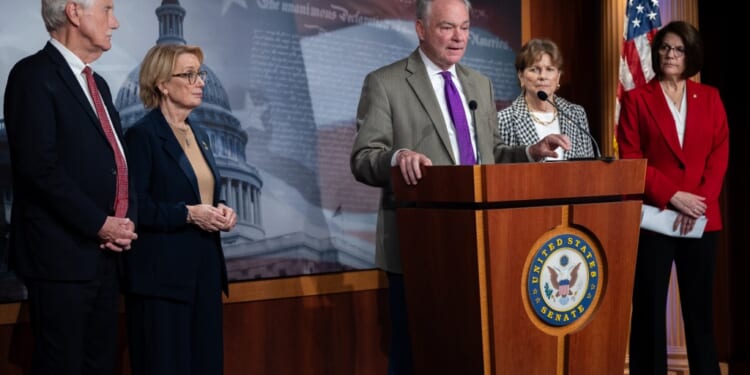
Democrats could have won.
The deal that the eight Democratic defectors reached with Senate Republicans will fund the government through January 30 (except for a few agencies that will be funded for the full fiscal year), trigger a vote in December on a Democratic bill to extend Obamacare subsidies, restore SNAP funding, undo layoffs to the federal bureaucracy that the White House ordered during the shutdown, and assure back pay to federal workers who were furloughed.
If you’re a Democratic voter, what’s not to hate?
Your party spent the last month insisting that unaffordable health care was a national crisis and a political hill to die on, only to decide in the end that it wasn’t willing to die. In fact, not only did Democrats capitulate on their demand for money for Obamacare customers, they failed to secure a promise from House Republicans to take up the matter if it advances through the upper chamber. Conceivably, the Democratic bill to extend subsidies could pass the Senate next month—and be fed straight into the shredder by Speaker Mike Johnson.
Losing when you’re behind is one thing, though. Losing when you’re ahead is maddening.
The biggest “liberty” taken by the current shutdown with the plot of the 2013 standoff is that, in this case, voters are angrier at the governing party than the hostage-takers. Twelve years ago it was Tea Party Republicans who took the brunt of public frustration, creating a new political conventional wisdom that whichever side instigates a shutdown will be blamed by Americans for the consequences. That conventional wisdom has now been shattered: Donald Trump’s Republicans reliably draw more blame in surveys about the current standoff than Schumer’s Democrats do.
It’s not clear why. Maybe it’s because Republicans have a “trifecta” in government, unlike Barack Obama’s Democrats in 2013. Maybe it’s because Trump is so domineering and authoritarian that low-information voters no longer believe Democrats wield any power over the government. Maybe it’s simply because voters sympathized with the Democratic cause in this case of making Obamacare affordable more than they sympathized with the Republicans’ cause in 2013 of stopping the program from being implemented.
Whatever the explanation, any doubt as to which side was being hurt more by the standoff was erased last Tuesday when Democrats obliterated Republicans at the polls. It’s unheard of for Trump to acknowledge that he and his party are on the wrong side of public opinion about something, but on the morning after the election he observed that the shutdown appeared to be hurting the GOP more than its opponents.
To grassroots liberals, Tuesday’s thumping read like a public vote of confidence in their party’s tactics and a desire for Senate Democrats to press on and not blink until Republicans did something constructive about affordability (for once!) by caving on Obamacare. A looming crisis at American airports in which understaffed air-traffic controllers and TSA screeners would somehow have to cope with the crush of Thanksgiving travel looked set to drive the president’s declining job approval lower and put more pressure on him to surrender. The wind was at Democrats’ backs.
And now they’ve thrown in the towel not even a week later, snatching defeat from the jaws of victory—by accepting an offer that’s been on the table for weeks, to boot.
To make matters worse, as Andrew Egger notes today at The Bulwark, they appear to have been cowed by Trump’s own brinkmanship. Firing federal bureaucrats, refusing to pay SNAP benefits, canceling flights, even calling on Senate Republicans to end the filibuster: The president played hardball too, believing that Democrats would eventually cry “uncle” if he threatened their political leverage in the upper chamber and made the shutdown more economically painful for Americans than it needed to be.
He was right. It was a test of nerve and a critical mass of Democrats ended up blinking. The supposed “concession” they got from the White House about restoring back pay for furloughed workers wasn’t even a real concession, Egger points out, since federal law already requires that.
It’s unlikely that Trump and Senate Republicans ever would have capitulated forthrightly to Schumer and his conference, partly because they wouldn’t want to encourage future hostage-taking and partly because “weakness” toward Democrats is one thing that feral right-wing populists can’t abide in their heroes. But the president is clearly spooked by how successful his opponents’ “affordability” message was at the polls last week and is suddenly throwing all sorts of dopey ideas at the wall to address the subject belatedly. Not letting Obamacare subsidies lapse is surely a more urgent priority for him than it was a week ago.
So, had the crisis dragged on much longer, one could have imagined him conniving with Senate Republicans to assure Schumer privately that he’ll have enough GOP votes to extend Obamacare subsidies if he agrees to reopen the government first. Trump has taken enough of a beating from this episode that he may have been willing to let Democrats win in the end—so long as he didn’t have to formally surrender.
Which is sort of what ended up happening, ironically. Trump didn’t surrender. And Democrats won.
Democrats did win.
It sure feels like a win that the worst-case scenario for liberals at this point is that millions of people lose their Obamacare subsidies and Republicans end up wearing that massive albatross for the next year. Voters just spent five weeks having it drummed into their heads that Democrats want to make health care more affordable and that Trump’s GOP intends to fight them every step of the way, and those voters have a clear side in that dispute.
That’s a pretty good position for the out-party to be in ahead of an election that’s shaping up to be about the cost of living, no?
The eight Democratic defectors also figured out a way to keep the issue front and center for a while. Next month’s Senate vote on extending Obamacare subsidies is another win-win for liberals—either Republicans will defeat the bill, further antagonizing affordability-minded voters, or the GOP will hand Schumer a total victory by belatedly agreeing to a compromise on funding the subsidies, no doubt at the president’s behest.
Trump doesn’t want this issue spoiling his chances of governing like an autocrat for the second half of his term, which is what will happen if the House flips. And, unlike the so-called fiscal conservatives in the congressional GOP, he cares nothing about the price tag of extending the subsidies. He’ll want to make some sort of deal on this before the midterms and there’ll be plenty of infighting on the right about it when he tries, to liberals’ great amusement.
But even if that deal fails to come together before the Senate votes on subsidies next month, Democrats still have an ace in their hand. Because funding under the new compromise bill will run out on January 30, we could potentially see another shutdown over Obamacare early next year. And the economic circumstances then might favor liberals more strongly than they do now: Imagine how desperate Trump will be to make big, splashy gestures to address the cost of living if inflation remains elevated or GDP turns negative next quarter.
Either Democrats get what they want on policy eventually, or they get a potent talking point that helps them rebrand as the “affordability” party—and, in any case, they get a do-over on this fight in less than three months if they want it. Their odds of retaking one or both houses of Congress next year are obviously higher now than before they instigated the shutdown. It’s hard to see that as a loss.
It would have been better if they had held out indefinitely and dared Senate Republicans to nuke the filibuster to reopen the government, an angry liberal might say at this point. Would it, though?
There are ways in which a filibuster-less Senate might have worked to Democrats’ immediate advantage. They wouldn’t have had to supply any votes to end the shutdown, for instance, sparing themselves the wrath of their base for “caving.” Ending the filibuster probably would have been unpopular with the public too, further damaging Trump and the GOP. And there are enough pro-filibuster Republicans in the Senate that getting them to switch on the issue might have required some ugly-even-for-him pressure tactics by the president, dividing the right.
It also would have left John Thune and Senate Republicans with no one to scapegoat the next time the president demands that they codify some inane idea he’s had, like unilateral executive tariff power. As long as the filibuster exists, Thune knows he and his conference can’t be blamed for why Trump’s worst proposals can’t be enacted. But the moment it’s gone: uh oh.
“Dare ‘em to nuke it” is an awfully big strategic gamble for Democrats to take, though, arguably existential for America.
Blocking government funding indefinitely and daring Republicans to unblock it by eliminating the filibuster would have wagered the future of the country on the congressional GOP’s willingness to defy Donald Trump, which is as bad a bet in politics as I can imagine. As the economic pain from the shutdown rose and the president’s bellowing about ending the filibuster grew louder, the right-wing base would have turned its rhetorical guns on Thune’s conference to end the Democratic hostage crisis by going nuclear and reopening the government. How confident are you that the lily-livered quislings of the Senate would have held out?
Maybe Thune would have convinced Trump to accept a “carve-out” to the filibuster instead of full repeal, keeping the 60-vote threshold for cloture in place except for government funding bills. But if instead Republicans ended up going full Duma by rescinding the filibuster entirely, the procedural path would be clear for the worst parts of the MAGA agenda to become statutory law. And as we’re being reminded right now by the debate over Obamacare, repealing statutory law is much easier said than done.
The other problem with daring ‘em to nuke it is that reopening the government on a party-line vote without any Republican concessions would have deprived Senate Democrats of next month’s vote on Obamacare subsidies and of their next shutdown opportunity on January 30. That might have successfully short-circuited the debate over health care in the near term, or overshadowed it with a new public debate about the pros and cons of the filibuster. If the point of all this was to either fund the subsidies or keep the issue in the public spotlight for as long as possible, a standoff that ended with the GOP going nuclear was arguably the worst outcome for Democrats.
And of course, there’s no guarantee that the public would have remained on the left’s side of this standoff had it dragged on for many more weeks. If holiday air travel had become an unholy mess, with the president attacking Democrats for spoiling Thanksgiving while Schumer et al. stuck their fingers in their ears and said “no Christmas until we get our money,” would voters have remained sympathetic to liberals’ hardball tactics?
Democrats ended up with a clear political win and may yet end up with a clear policy win as pressure rises on Trump to rebuild his inch-thin credibility on kitchen-table issues by doing something about subsidies. That’s not bad for a shutdown, a tactic heretofore notorious for never accomplishing anything.
Trump envy.
I don’t think leftists are primarily angry today because their leadership failed to restore Obamacare funding, though. That was always a long shot.
They’re angry because this standoff was a tacit experiment to see how ruthless their leadership is willing to be in a moment of civic desperation, and the result was “still not as ruthless as Trump.”
Democrats were ruthless enough to take the government hostage as leverage for a policy demand, the first time they’ve done so in the Tea Party era. And they were ruthless enough to hold that hostage for more than a month, surprising even the White House with their resolve. But the eight defectors, at least, plainly weren’t as ruthless as the president about letting the shutdown visit sustained financial hardship on Americans caught in the middle. Nor were they as procedurally ruthless as him, preferring to capitulate and avert a showdown over the filibuster rather than join their “dare ‘em to nuke it” colleagues.
Contrary to popular belief, Trump doesn’t have a limitless tolerance for political pain. During his first term he caved on separating immigrant families, then caved again on demanding funding for the border wall during the 2018 government shutdown. Earlier this year he slapped tariffs on most of the world on “Liberation Day” before hurriedly pausing those tariffs a week later when markets grew uncomfortably wobbly. That’s why I think there’s a chance he would have brokered a deal on subsidies had Democrats let the shutdown go on—Trump does respond at times to public opinion.
But he’s also far more willing than the average politician to harm institutions and the constituents they serve for the sake of strengthening his hand politically, as 700 or so editions of this newsletter have hopefully demonstrated. That’s what this shutdown was about for liberals who demanded that their leaders “fight” until the subsidies were funded or the filibuster was nuked. They wanted to see Democrats evince the same uncompromising ruthlessness toward achieving his goals that the president routinely demonstrates.
Instead, eight of them choked, unnerved by the prospect of a Senate GOP unbound by the 60-vote rule and by what months without SNAP benefits would do to poor American families.
Are you willing to bust norms and cause suffering to gain power and move your agenda? The right has given a very clear answer to that question and was rewarded with control of all three branches of government for it. The left’s answer is not as clear, and it languishes for the moment in near-irrelevance. And so the last month seems like a loss to progressives even though, by any measure, it’s the most successful shutdown in American history: Having convinced themselves that it’ll take ruthlessness to beat ruthlessness, they’ve discovered that their leaders don’t quite have Trump’s stomach for it. Yet.

















